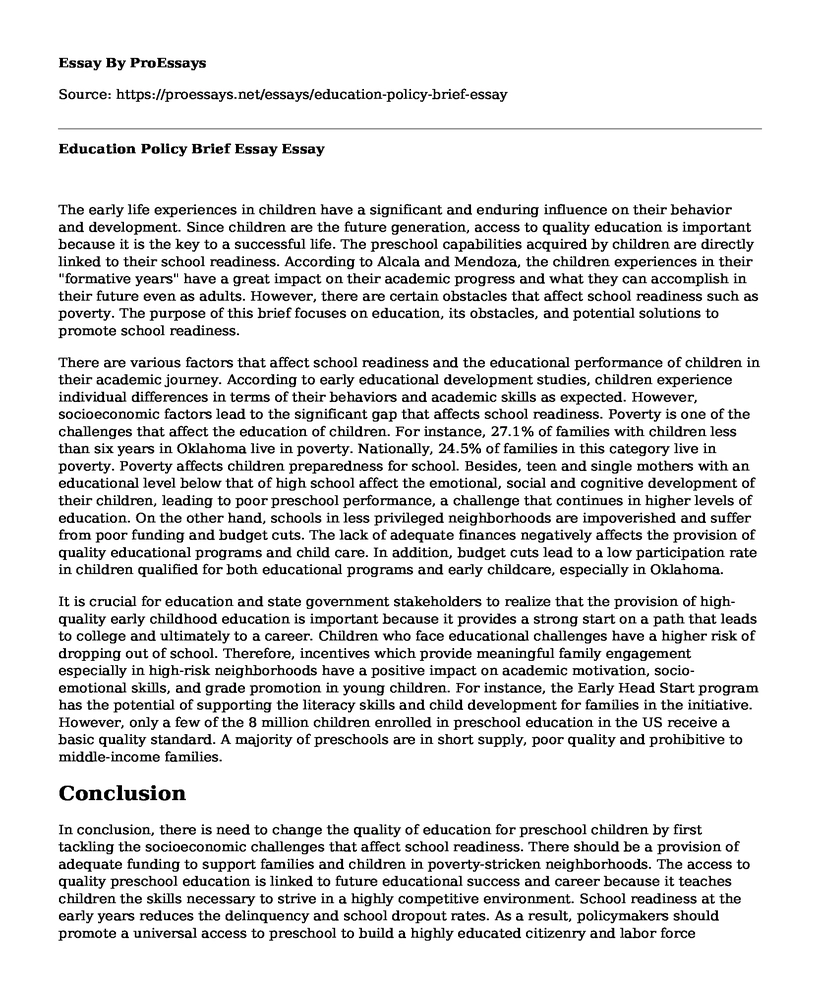The early life experiences in children have a significant and enduring influence on their behavior and development. Since children are the future generation, access to quality education is important because it is the key to a successful life. The preschool capabilities acquired by children are directly linked to their school readiness. According to Alcala and Mendoza, the children experiences in their "formative years" have a great impact on their academic progress and what they can accomplish in their future even as adults. However, there are certain obstacles that affect school readiness such as poverty. The purpose of this brief focuses on education, its obstacles, and potential solutions to promote school readiness.
There are various factors that affect school readiness and the educational performance of children in their academic journey. According to early educational development studies, children experience individual differences in terms of their behaviors and academic skills as expected. However, socioeconomic factors lead to the significant gap that affects school readiness. Poverty is one of the challenges that affect the education of children. For instance, 27.1% of families with children less than six years in Oklahoma live in poverty. Nationally, 24.5% of families in this category live in poverty. Poverty affects children preparedness for school. Besides, teen and single mothers with an educational level below that of high school affect the emotional, social and cognitive development of their children, leading to poor preschool performance, a challenge that continues in higher levels of education. On the other hand, schools in less privileged neighborhoods are impoverished and suffer from poor funding and budget cuts. The lack of adequate finances negatively affects the provision of quality educational programs and child care. In addition, budget cuts lead to a low participation rate in children qualified for both educational programs and early childcare, especially in Oklahoma.
It is crucial for education and state government stakeholders to realize that the provision of high-quality early childhood education is important because it provides a strong start on a path that leads to college and ultimately to a career. Children who face educational challenges have a higher risk of dropping out of school. Therefore, incentives which provide meaningful family engagement especially in high-risk neighborhoods have a positive impact on academic motivation, socio-emotional skills, and grade promotion in young children. For instance, the Early Head Start program has the potential of supporting the literacy skills and child development for families in the initiative. However, only a few of the 8 million children enrolled in preschool education in the US receive a basic quality standard. A majority of preschools are in short supply, poor quality and prohibitive to middle-income families.Conclusion
In conclusion, there is need to change the quality of education for preschool children by first tackling the socioeconomic challenges that affect school readiness. There should be a provision of adequate funding to support families and children in poverty-stricken neighborhoods. The access to quality preschool education is linked to future educational success and career because it teaches children the skills necessary to strive in a highly competitive environment. School readiness at the early years reduces the delinquency and school dropout rates. As a result, policymakers should promote a universal access to preschool to build a highly educated citizenry and labor force fundamental for future generations.
Works Cited
Alcala, N. and C. Mendoza. "Measuring How Poverty-Related Risks to Children's Wellbeing Affect Their Progress in School | Scholars Strategy Network."
Scholarsstrategynetwork.org, Mar. 2018, www.scholarsstrategynetwork.org/brief/measuring-how-poverty-related-risks-childrens-wellbeing-affect-their-progress-school-0. Accessed 24 Mar. 2018.
Falchi, Lorraine, and Jennifer W. Friedman. "Rethinking the Discourse of Readiness in
Preschool." Rethinking Readiness in Early Childhood Education, 2015, pp. 109-121.
Johansson, Eva, and Johanna Einarsdottir. Values in Early Childhood Education: Citizenship for Tomorrow. Taylor and Francis, 2017.
Cite this page
Education Policy Brief Essay. (2022, Apr 04). Retrieved from https://proessays.net/essays/education-policy-brief-essay
If you are the original author of this essay and no longer wish to have it published on the ProEssays website, please click below to request its removal:
- Students as Either Customers or Learners
- Corruption in Radium Girls Essay
- The Evidence-Based Practice Capstone Project Evaluation Paper Example
- The Importance of College Education - Essay Sample
- Deficit Spending Essay Example
- Forming Health Policy: A Necessary Step for Healthy Nations - Essay Sample
- Free Essay Example on Thorndike's Law of Effect: Stimuli-Response & Reinforcement







